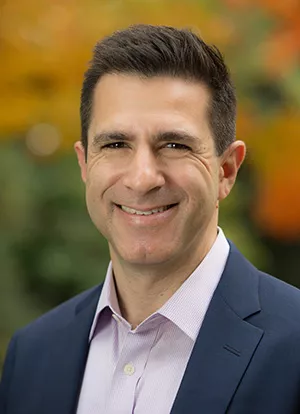Political Scientist Ben Berger to Promote Engaged Scholarship through Prison Education Symposium

Associate Professor of Political Science Ben Berger
This spring, Ben Berger is taking Engaged Scholarship to the next level.
The associate professor of political science and executive director of the Lang Center for Civic & Social Responsibility returns this semester to the campus of his undergraduate alma mater, Princeton University. As Laurance S. Rockefeller Visiting Professor for Distinguished Teaching, he joins the ranks of eminent scholars who have held the position, including psychologist Jonathan Haidt, comparative literature scholar Peter Brooks, and political theorists Quentin Skinner and Melissa Williams.
More importantly, Berger is building upon his and the Lang Center’s emphasis on joining higher education and community development, most notably with a Prison and the Academy symposium being held at Princeton on Monday, April 15, at 4:30 p.m.
“The symposium will highlight the ways in which prison education can facilitate mutual and reciprocally beneficial community partnerships—often a difficult ideal for engaged scholars to attain,” says Berger.
It will include a strong contingent from Swarthmore—whose participating students, faculty, alumni, and staff will include Keith Reeves ’88, professor and chair of political science, who for years has taught an “Inside Out” course at the College and who directs the Lang Center’s Urban Inequality and Incarceration program. And it has the potential to further the collaboration and understanding among New Jersey’s incarcerated and nonincarcerated scholars, says Berger.
In the days leading up to the symposium, Berger discussed his hopes for the event as well as his experience thus far with the visiting professorship.
What sets this symposium apart, and what do you hope people will take from it?
In place of the more common format in which a few participants read academic papers, our relatively large panel will feature shorter presentations in the fashion of TED talks and will canvass a range of teaching, research, and policy initiatives. After the presentations, during a substantial Q&A and mingling period, I hope for symposium attendees to make connections with presenters for the purpose of future collaboration. In other words, I hope for this symposium to generate not only intellectual but social capital and new energy.
Who will be joining you from Swarthmore?
Professor Reeves, who introduced me to prison education, will be co-presenting with political science major Jack Pokorny ’19; Assistant Professor of Sociology Nina Johnson, whose commitment to prison education and engaged scholarship has inspired me to greater involvement; Lucy Lang ’03, who will be co-presenting with Jarrell E. Daniels, a formerly incarcerated scholar now working with Lang at the Institute for Innovation in Prosecution; and Thomas (Reem) Cotton, who trained me in combined course pedagogy while incarcerated at Graterford Prison and who is now co-teaching the on-campus Princeton preceptorial with me, as well as working with the Lang Center.
How might the College and Princeton continue to collaborate on such programs?
I’ve been working with [Reeves] to develop collaborative programs with a number of other institutions, including Princeton, Georgetown, and Howard University. Teaching “combined” or Inside Out courses has thus far proved easier, institutionally, in Pennsylvania than in New Jersey, and we would love to work with Princeton on furthering their combined course offerings while benefiting from their rich concentration of student activist groups. Swarthmore has been fortunate this year to secure a campus chapter of the Petey Greene prison tutoring program, which originated at Princeton and still thrives there. And Swarthmore students have already made the short drive to Princeton to attend the inspiring annual SPEAR (Students for Prison Education and Reform) conference.
But perhaps the most exciting collaborative prospect lies in the area of prison “think tank” development. Prison think tanks enable incarcerated scholars to meet regularly with outside scholars for varied purposes, including research collaborations, policy proposals, and teacher training. [Johnson] and [Cotton] have long experience with the tremendously successful Phoenix Think Tank (formerly the Graterford Think Tank), and while we don’t know for certain whether anything similar could be developed in New Jersey, my inside and outside students this semester, as well as many other Princeton colleagues, have expressed serious interest in the prospect.
What have been the other highlights of your visiting professorship?
I’m teaching a combined course, Punishment: Theory and Practice, with Princeton students and incarcerated students at East Jersey State Prison (EJSP), in the same vein as the one that [Reeves] teaches at Swarthmore each spring and that I co-taught with him last year. There is clearly a huge appetite for this kind of pursuit among both the Princeton and EJSP students; we had more than 30 applicants for only seven spots at Princeton.
I’ve been trying to advocate here for the approach that we’ve taken at Swarthmore: to regard prison education as a vital locus of engaged scholarship, and to stress the ways in which “inside” (incarcerated) and “outside” (Princeton or Swarthmore) students can co-create knowledge and change public perceptions and public policy.
Visiting at Princeton has been an immense privilege, especially thanks to my hosts at the University Center for Human Values (UCHV). Exchanging ideas with Professor of Politics Melissa Lane, who directs the UCHV, and the many visiting fellows has stimulated my thinking in multiple directions. It’s made me that much more eager to continue my work at Swarthmore, both learning for its own sake and scholarship in the service of the public good.
The eighth annual Prison and the Academy symposium, hosted by Princeton’s Prison Teaching Initiative, will be held Monday from 4:30 to 7 p.m. in Lewis Library Room 120 at Princeton University. It is free and open to the public.
Learn about Swarthmore’s impact on the local and global community at lifechanging.swarthmore.edu.

Joining Berger at the symposium are clockwise from top left: Professor of Political Science Keith Reeves '88, Assistant Professor of Sociology Nina Johnson, Jack Pokorny '19 and Lucy Lang '03.



